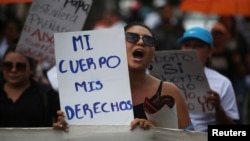El Salvador should apply a moratorium on laws that punish women with harsh jail terms for having an abortion while it reviews cases of those already incarcerated in the socially conservative Central American country, a top U.N. official said Friday.
Zeid Ra'ad Al Hussein, the United Nations High Commissioner for Human Rights, said in a statement he spent part of his two-day trip meeting with women imprisoned for the crime of "aggravated homicide" due to what he described as obstetric emergencies.
"I am appalled that as a result of El Salvador's absolute prohibition on abortion, women are being punished for apparent miscarriages and other obstetric emergencies, accused and convicted of having induced termination of pregnancy," he said in a statement.
He called on authorities to review all cases of women detained for offenses related to abortion, which the local Citizen Group for the Decriminalization of Abortion puts at 27 cases in which exclusively poor women have been sentenced to jail terms of six to 35 years.
Al Hussein proposed that the review be conducted by presidential decree and carried out by an expert committee that would include international members.
Calls to El Salvador's communications ministry seeking comment on Al Hussein's comments were not immediately returned.
Since 1997, the Central American country has had one of the most severe laws targeting women and people who assist with abortions.
Last year, the party of leftist President Salvador Sanchez Ceren proposed that Congress reform the country's abortion law to allow for exceptions to the blanket prohibition.
The exceptions would include instances when the life of the mother is at risk, when the pregnancy resulted from rape or human trafficking, or when the fetus suffers from a malformation that would render it inviable.





